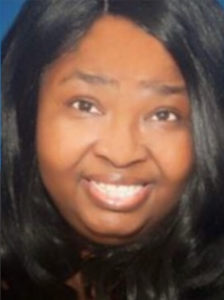For our Women in Leadership series, we were honored to interview Charlene Pitchford, a graduated Circle Leader who has become a trusted community leader in Richmond, VA. A native of Washington D.C., Charlene is a board member with Circles RVA. She currently serves as the Treasurer of the Gilpin Court Tenant Council and has been active in several local organizations, including the Historic Jackson Ward Association, George Washington Carver Elementary School Parent Teacher Association, and Healthy Start RVA. In 2023, Charlene was elected Vice Chair of RRHA (Richmond Redevelopment and Housing Authority). She will step into the role of Ally for Circles RVA’s next cohort, due to launch in May 2024.
Charlene, what has your leadership experience in Circles meant to you?
My experience in Circles has meant three things to me. The first is a new beginning towards becoming self-sufficient. By “a new beginning,” I mean that I had no clue what it really meant to be self-sufficient before I joined Circles RVA. I thought of self-sufficiency as a way of making do with what you had, relying solely on benefits programs, and trying to find every giveaway program in Richmond, Virginia. Circles RVA made me realize that nothing in life is free; someone had to pay for every [dollar] I was receiving in benefits from the federal and state assistance programs.
 Circles RVA helped me to understand what a budget is. I learned how a well-planned budget can help me meet my financial goals and objectives. As I tracked where all my money was spent, I began to see that I had to get off the path that I was on. I had to change my spending habits to become more efficient with the resources and income coming into my household. I also had to learn that changing a bad spending habit is being honest with those who are trying to help you become self-sufficient.
Circles RVA helped me to understand what a budget is. I learned how a well-planned budget can help me meet my financial goals and objectives. As I tracked where all my money was spent, I began to see that I had to get off the path that I was on. I had to change my spending habits to become more efficient with the resources and income coming into my household. I also had to learn that changing a bad spending habit is being honest with those who are trying to help you become self-sufficient.
The second thing that I learned from my leadership experiences in Circles RVA, was learning to trust a stranger with intimate things in my life, such as my family dynamic (the size of my family, what things do we like to do, what time is “family time,” how does my husband feel about Circles RVA, etc.). Before Circles RVA, I had people come into my life to do things that benefited them—not me. I was a foster child who had no family members [growing up] to help me with basic life skills.
Finally, I learned from my leadership experiences in Circles RVA to change my mind about being self-reliant and have confidence in myself: to become independent of federal and state welfare programs as my only income. When I started looking for jobs during my time in Circles RVA, I was scared at first. I didn’t want to lose my federal and state benefits. Once I was working, however, I started feeling much better about being self-sufficient. When I learned how to make a budget to determine what I should and shouldn’t spend my money on, I had a new beginning to start living.
Why is it important that women lead poverty reduction work?
Women need to stay focused on things that cause financial barriers. We seem to struggle with competing for good paying jobs. The #MeToo movement and others like it [show] that we want our voices to be heard about disparities, especially [for] low-income women.
Women’s health issues need focus, in my opinion, due to the lack of access and affordability. In most families, women are the income maker. But the type and [quality] of care women receive is often based on what type of insurance they can afford. Women are faced with decision-making; that can lead to stress, which can lead to health issues. Low-income women may experience more stressors than higher-income women. And in the real world, when you go to the doctor, all the doctor wants to hear is what brought you to the doctor and how they can help you. There is no [medical] help available like Circles RVA, [where] participants can make their goals, objectives, and dreams a reality.
What is one important thing you have learned working with people over the years?
I learned from collaborating with leaders over the years to listen and be slow. To quote my mother, “It is better to have peace than to give peace. Because when you have peace (such as peace of mind), a thing just goes smoother. One may get tired of giving peace.” I’ve also learned the true [meaning of] the word Accountability—how I must take responsibility for my actions.
What do you think is the most crucial quality for women in leadership?
To lead with assertiveness and with compassion for others’ feelings, even if you may not agree with [their] opinions or goals. Being honest is the best quality one can have, and I believe everyone should think positive and lead with integrity.
Click the donate to Circles USA button and help us celebrate 25 years of
extraordinary women building community to end poverty!